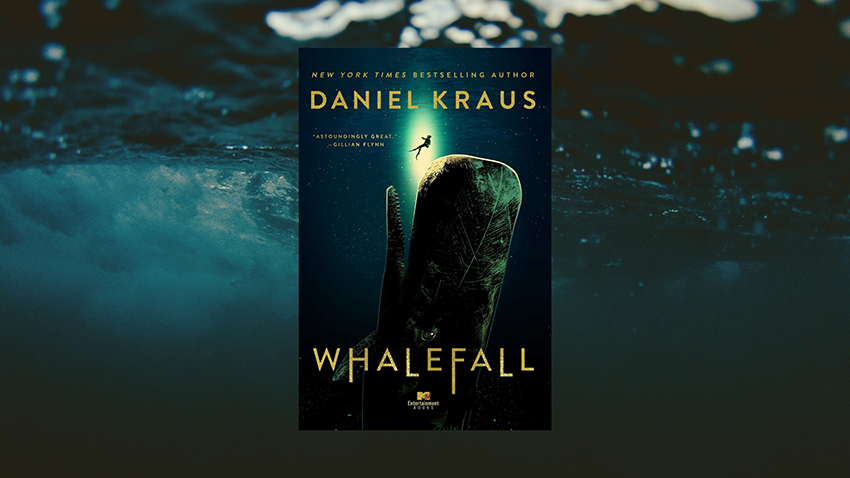Book Review: Whalefall by Daniel Kraus
Daniel Kraus’s Whalefall is an extraordinary novel that marries harrowing survival adventure with profound emotional depth, resulting in a story that resonates long after the final page. The book’s premise—a young diver swallowed alive by a sperm whale—might sound like a biblical parable, but Kraus transforms it into an intense meditation on life, death, and the intricate dynamics of a father-son relationship. Through vivid prose, meticulous detail, and a raw emotional core, Kraus crafts a narrative that is both thrilling and achingly human.
At its heart, Whalefall is a story about Jay Gardiner, a 17-year-old diver, who embarks on a solo underwater expedition to find and dispose of his estranged father’s remains. The dive takes a catastrophic turn when Jay is swallowed by a sperm whale, forcing him to confront not only the immediate threat of suffocation and death but also the memories of his strained relationship with his father. The narrative alternates between Jay’s fight for survival and flashbacks to his life with his father, Mitt, whose love for the ocean mirrors Jay’s and whose uncompromising parenting style has left deep scars.
Kraus’s writing is at once visceral and lyrical. The immense detail he provides about the anatomy of the whale, the physiology of diving, and the intricacies of survival under such extreme conditions creates a sense of authenticity that immerses the reader fully in Jay’s ordeal. The interior of the whale is described with unflinching precision, from the choking darkness to the oppressive heat, to the visceral details of the whale’s digestive processes. Kraus doesn’t shy away from the grotesque, but these descriptions serve more than just shock value—they ground Jay’s struggle in a vivid, tactile reality. The reader feels the weight of the whale’s stomach pressing on Jay’s body, the acidic burn on his skin, and the stifling lack of air. This attention to detail transforms *Whalefall* into a survival story that is as physically intense as it is emotionally gripping.
The narrative is propelled by Jay’s attempts to survive using the limited tools at his disposal, including his scuba gear, a knife, and a few glow sticks. Kraus captures the delicate balance of hope and despair as Jay’s resourcefulness is tested against the overwhelming odds. Every breath Jay takes feels like a victory; every moment of hesitation could be his last. Yet, as much as the story is about surviving the belly of the beast, it is equally about the emotional journey Jay undertakes as he processes his fraught relationship with Mitt.
The father-son dynamic is the beating heart of Whalefall. Kraus masterfully interweaves Jay’s present struggle with flashbacks to his relationship with Mitt, a man whose larger-than-life persona and obsession with the ocean made him both inspiring and alienating. Mitt’s tough-love approach to parenting often veered into cruelty, leaving Jay with feelings of inadequacy and resentment. Yet, as Jay recalls moments of tenderness and connection—like Mitt teaching him how to dive or sharing his encyclopedic knowledge of marine life—a fuller picture of their relationship emerges. Kraus captures the complexity of familial love: the way it can be both a source of strength and a source of pain, how it can leave scars yet also provide the tools needed to survive.
One of the most compelling aspects of the novel is how Kraus uses the whale as a metaphor for Jay’s psychological journey. Being swallowed by the whale becomes a symbolic descent into the depths of his own grief and unresolved emotions about his father. Inside the whale, Jay is forced to confront not only his physical mortality but also the emotional baggage he has carried since his father’s death. Kraus draws subtle parallels between the whale and Mitt—both are immense, overwhelming presences that have shaped Jay’s life in profound ways. Escaping the whale is not just about survival; it’s about finding a way to make peace with his father’s legacy and his own identity.
The pacing of the novel is relentless, with each chapter tightening the tension as Jay’s oxygen supply dwindles and the whale’s stomach grows increasingly hostile. Yet Kraus manages to infuse moments of reflection and introspection, allowing the reader to catch their breath and delve deeper into Jay’s psyche. These quieter moments are some of the book’s most powerful, as they reveal the depth of Jay’s inner struggle and his growing understanding of his father.
Kraus’s prose is poetic yet unflinching, capturing both the beauty and brutality of the natural world. His descriptions of the ocean are awe-inspiring, portraying it as a place of wonder and terror, a realm that both connects and separates Jay and his father. The contrast between the vast, open ocean and the claustrophobic confines of the whale’s stomach underscores the novel’s themes of freedom, confinement, and the inescapable ties of family.
In Whalefall, Kraus has crafted a story that is as gripping as it is deeply moving. It’s a tale of survival, but also of reconciliation—with death, with the past, and with the complexities of love. Through Jay’s journey, Kraus explores what it means to carry the weight of a parent’s expectations and failings, and how to find strength and self-understanding in the most unlikely of places.
Whalefall is a testament to Kraus’s skill as a storyteller and his ability to weave immense detail and emotional complexity into a narrative that is both thrilling and profoundly human. It’s a book that lingers in the mind and heart, reminding us of the depths we must sometimes descend to in order to truly surface.













